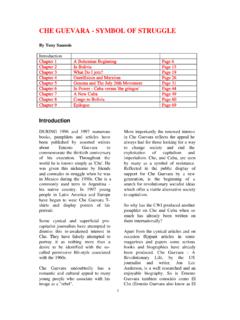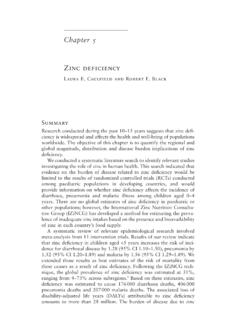Transcription of Engineering UK 2018
1 Engineering UK 2018. Synopsis and recommendations Synopsis Synopsis Engineering UK 2018: The state of Engineering Synopsis rise in number of UK total workforce Engineering plays a vital role in the UK's economic and societal wellbeing, providing quality employment on a large scale and some of the key solutions to major global 6%. of UK Engineering enterprises between 19% employed in the Engineering sector challenges. In the face of technological advancements and a changing political and 2015 to 2016. economic landscape, developing the pipeline to address the skills needs of the Engineering sector remains a key challenge. The Engineering To further improve the precision of the Engineering footprint, jobs within the footprint were furthermore classified as core or related.
2 Economy Manufacturing enterprises within the Engineering footprint remain the largest economic contributor of the Engineering - based industries, generating billion GVA (or of footprint Core Engineering jobs were defined as Engineering roles that require the consistent application of Engineering knowledge Our findings unequivocally demonstrate Engineering is a critical part of the UK economy, both in respect of the GVA for all industries) in 2015. Indeed, in 2016 almost half of the Engineering footprint turnover came from manufacturing and skills to execute them effectively. Core Engineering jobs direct contributions to turnover and employment and its ( ). But contributions from other Engineering sectors were Because the boundaries of what constitutes Engineering are include those that are self-evidently Engineering : the multiplier' effect.
3 Also considerable: the construction industry generated GVA of often blurred, determining a clear definition of Engineering Engineering professionals minor' group of civil, mechanical, billion, IT, telecommunications and other information can be difficult, with different organisations historically electrical, electronics, design and development and production Productivity service activities billion, and mining and quarrying taking different approaches. To aid consistency, in 2017 the and process engineers. The core' definition also includes Productivity is a key factor in the standard of living in a national billion in 2015. Engineering Council, Royal Academy of Engineering and EngineeringUK reviewed and updated the list of jobs and those who require consistent use of Engineering competences economy, with higher levels meaning improved economic One of the more visible contributions of Engineering to UK.
4 Industries deemed to constitute Engineering . The footprint for example, a draughtsperson or a welder. growth and a more prosperous society, with attendant productivity is the construction of new national infrastructure. used in this report reflects this revised version. increases in funding for public services. That the UK has seen In July 2016, the government major projects portfolio had Meanwhile, related Engineering jobs were defined as those its productivity decline below that of competitor nations has 143 projects worth over 455 billion. Skills found in the The Engineering Council, Royal Academy of Engineering and that require a mixed application of Engineering knowledge been a long-standing concern for policy-makers and Engineering footprint are needed for projects in every EngineeringUK agreed to standardise the footprint using a and skill alongside other skill sets, which are often of greater employers alike.
5 Category in the portfolio. binary approach, whereby an industry sector or an occupation importance to executing the role effectively. An architect is is considered to be wholly in or out of the footprint. A set of an example of a related Engineering occupation. While the causes of the UK's poor productivity record are criteria regarding the level of qualifications and skills deemed contested, it is clear that simply hiring more workers will not be Revisions to the Engineering footprint mean that figures to be required for Engineering roles was agreed and an enough to achieve a step change: the productivity of existing concerning the Engineering footprint in this report are not extensive review of standard occupational classification (SOC) employees also needs to be improved, both through comparable to previous reports but will enable consistency and standard industrial classification (SIC) lists undertaken.
6 Investment in technology and skills, and the strengthening of across the sector going forwards. Where time series are the educational pipeline. As a result of this review, 10 job titles were removed from the presented in the report, these figures have been recalculated of registered Our findings show that Engineering is a crucial sector for 27%. footprint, three were added and four remained with input from to reflect the revised Engineering footprint and are intended enterprises in external organisations. Fourteen industries were removed to be compared. raising the UK's productivity levels. Research by the Centre from the list of SICs and two were added. for Economics and Business Research (Cebr) on the UK were in the EngineeringUK's behalf found that the Engineering sector Engineering sector had a strong multiplier effect on the economy, generating a further Gross Value Added (GVA) for every 1 GVA.
7 Created directly in the Engineering industries. What's more, every additional person employed through Engineering activity was projected to create a further jobs down the supply ngineering j ee ob chain. Overall, they estimated that the Engineering sector or generated 25% of the UK's total GDP in 2015 ( billion). C. s Engineering sector Non Engineering sector Engineering jobs in Engineering jobs in Engineering sector non Engineering sector Re s la t job ed e n g i n e e ri n g 1 2. Synopsis Synopsis jobs Engineering supported by every person employed generated 23%. 157,000 7,200 Engineering ( trillion) of the and technical workers in Engineering new jobs in big data needed in high speed rail UK's total turnover (a multiplier effect of ) by 2020 by 2020.
8 Engineering enterprises Analysis by the Office of National Statistics for EngineeringUK. Skills needs New technology is likewise transforming the Engineering skills needs of construction and rail and road infrastructure. A critical part of Network Rail's railway upgrade plan, the However, while nominal wages are rising, real wages appear to be stagnant. Economists have speculated that this wage stagnation is both a consequence of the UK's low labour indicates that just over a quarter ( or 687,575) of the The world of work is changing, with a growing trend in largest modernisation programme since the Victorian era, productivity and the inflation it has experienced since the million registered enterprises in the UK in 2016 were in the economically developed countries toward an hourglass involves moving from signalling based on fixed blocks of track country's decision to leave the EU.
9 Engineering sector, representing a growth in terms of the shaped economy. Technological advances have been key to to block signalling sited within moving trains to increase the number of enterprises over the previous year. Moreover, this Within this context, the UK's decision to leave the EU brings this transformation, resulting in the expansion of knowledge- capacity of the network. The programme includes High Speed year-on-year growth was observed across all industries within significant uncertainty to the sector. While the economy intensive services and increased demand for highly skilled 2 and Crossrail, as well as electrification and station upgrades. the Engineering footprint.
10 Reflecting the growing trend in has not suffered as much as the Treasury predicted it would labour. As we move further towards an hourglass economy, Unsurprisingly, these major projects necessitate a significant digitalisation, the information and communication industry following the UK's decision to leave the EU, there are signs that fuelled by the fourth industrial revolution, there are clear number of engineers. It is anticipated that an additional 7,200. saw the largest increase in the number of Engineering this resilience is declining because of the falling pound and implications for the Engineering sector and its skills needs. Engineering and technical workers will be needed in high speed enterprises, growing by over the last year and rising prices.












